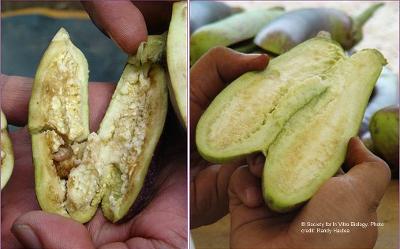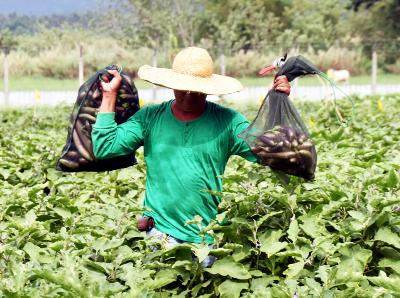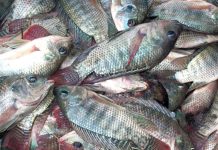The long wait is over!
Finally, the Bureau of Plant Industry (BAI) – a line agency of the Department of Agriculture (DA) – has approved the transgenic eggplant for direct use as food, feed, or for processing (FFP).
In issuing Biosafety Permit No. 21-078FFP, the eggplant – called Bt eggplant event ‘EE-1’ – is found “to be safe as conventional eggplant” and “can substitute for its traditional counterpart.”
The biosafety permit, which was sent to the University of the Philippines at Los Baños (UPLB), was issued after rigorous assessment pursuant to the Joint Department Circular (JDC) No. 1, Series of 2016 by five government agencies.
Aside from DA, the four other agencies are: Department of Science and Technology (DOST), Department of Environment and Natural Resources (DENR), Department of Health (DOH), and Department of Interior and Local Government (DILG).
The good news was announced by the Laguna-based International Service for the Acquisition of Agri-Biotech Applications (ISAAA) in its website (www.isaaa.org)
“The FFP approval of Bt eggplant is the latest milestone in the biosafety regulatory process in the Philippines,” ISAAA said in a statement. “To complete the biosafety regulatory process, Bt eggplant will need commercial propagation approval for environmental safety assessment before it can be made available to the public.”
Common soil bacterium
The approved eggplant is spliced with Bacillus thuringiensis (Bt). A common soil bacterium, Bt produces a protein that paralyzes the larvae of some harmful insects.
In the past, Bt was cultured by fermentation. In fact, over the last 40 years, Bt has been used as an insecticide by farmers around the world. It is said that organic farming has benefited from it as it is one of the very few insecticides permitted by organic standards.
“The insecticide is applied either as a spray, or as ground applications. It comes in both granules and liquefied form,” said a briefing paper published by the Global Knowledge Center on Crop Biotechnology.
 Eggplant pest
Eggplant pest
One pest that causes so much damage to eggplants is the eggplant fruit and shoot borer (EFSB). It feeds almost exclusively on eggplant. According to studies, an entire crop can be lost from EFSB infestation.
“The worm of the insect bore tunnels in the fruit, rendering them unfit for consumption,” said Dr. Emil Q. Javier, former secretary of the Department of Science and Technology (DOST) and now a national scientist.
Some studies have shown that 51-73% of the crop is lost when there is no control of any form done. There is also no known genetic resistance to EFSB in cultivated and wild eggplants.
“The insects are concealed in the shoots and fruits and are difficult to reach,” Dr. Javier explained. “Thus, in order to protect their crops, farmers spray their plants almost every other day with insecticides.”
Unacceptable method
Edgar C. Talasan is a vegetable farmer from Barangay Imalutao in Impasug-ong, Bukidnon. He said in his 15 years of vegetable farming, in every eggplant cropping cycle, he sprayed at least twice a week. For every 1,000 eggplant hills, he uses 0.5 kilogram of Lannate, two bottles (250 mL) of Prevathon, two bottles (250 mL) of Alika, one liter of Karate, one kilogram of Daconil, and 0.5 liter of Selecron.
Dr. Emiliana Bernardo, an entomologist or a scientist who studies insects, said the current methods used by some eggplant growers in controlling the EFSB are unacceptable. She added that the practice is also unhealthy to consumers, farmers, and the environment.
Dr. Bernardo reported that studies conducted in major eggplant producing provinces found that almost all farmers use chemical insecticides and that some even dip the unharvested eggplant fruits in a mix of chemicals just to ensure that harvests are marketable.
But there are also farmers who don’t use chemicals to destroy the pest. They do so by doing any of the following: manual removal of infested shoots, crop rotation, intercropping, using nylon net barriers, trapping of the male using pheromones, applied either singly or in an integrated manner.
But all these are “labor-intensive and generally ineffective,” to quote the words of Dr. Asuncion K. Raymundo and Dr. Rita P. Laude, who conducted some studies on eggplant.
Biological insecticide
One possible solution to the problem is to introduce Bt into the vegetable crop. The UPLB’s Institute of Plant Breeding spearheaded the development of Bt eggplant.
“Bt eggplant was developed by genetically engineering a gene from the bacteria so that the GM eggplants now produce a protein that defends it against insect attacks,” explained Dr. Michael Purugganan, a Filipino plant geneticist who is the Dean of Science at the New York University.
Bt is present in the Philippine soil and has been in use for years without any harmful effects. In her landmark novel, Silent Spring, Rachel Carson recommended Bt as a biological pesticide because it has much less environmental impact than conventional chemical pesticides.
Research on Bt eggplant commenced in 2003 in the UPLB laboratory. From 2007 to 2009, a contained experiment was conducted under the supervision of the National Biosafety Committee of the Philippines. From 2010 to 2012, field trials were done in Laguna, Pangasinan, Camarines Sur, and North Cotabato.
No to Bt eggplant
A field trial was also conducted at UP Mindanao in Davao City. But on December 13, 2010, Mayor Sara Z. Duterte-Carpio ordered the uprooting of around 1,800 hills of Bt eggplant in an experimental station inside the campus.
“(Based) on the report of the Davao (City Agriculture Office),” said the mayor’s cease and desist order, “you have only complied with three of 15 conditions that enables you to engage in such field testing.”
That was a big blow to Bt eggplant. But the biggest let down came on May 17, 2013 when the Supreme Court (SC) decided to permanently halt the field testing of Bt talong based on the petition filed by Greenpeace Philippines and Magsasaka at Siyentipiko para sa Pag-unlad ng Agrikultura.
“The testing or introduction of Bt eggplant into the Philippines, by its nature and intent, is a grave and present danger to (and an assault on) the Filipinos’ constitutional right to a balanced ecology, because in any book and by any yardstick, it is an ecologically unbalancing event or phenomenon,” read the SC decision.
According to Dr. Eufemio Rasco, Jr., an academician at the National Academy of Science and Technology, the decision was based on the “precautionary principle.” It stated: “Where there are potential adverse effects (of a technology), lack of full scientific certainty shall not be used as a reason for postponing appropriate measures to prevent environmental degradation.”
While the petitioners were “overjoyed on the decision” of the SC, Dr. Javier believed the real losers are the poor farmers themselves and the consuming public. “Our small farmers are deprived of modern means of raising productivity, competitiveness and incomes,” he wrote. “They are denied potential sustainable farming technologies that can substantially reduce the need for harmful pesticides to protect their crops.
“Big losers as well are the low-wage-income consumers who are ultimately penalized with high food prices and excessive pesticide residues in the food they eat,” Dr. Javier added.
Reversal of ruling
Fortunately, on July 26, 2016, the SC en banc unanimously reversed its previous ruling. The SC decision further stated that since no commercial propagation of Bt eggplant took place and research activities never went beyond the field trial phase, “any future threat to the public to a healthful and balanced ecology is more imagined than real.”
All’s well, end’s well, so goes the saying. “With the field trials of Bt eggplant already completed, confirming the efficacy of the technology against the fruit and shoot borer and its safety towards beneficial and non-target insects, and with the unanimous ruling of the SC reversing its earlier decision against field tests, immediate commercial release should be considered by its developer,” suggested Dr. Panfilo G. De Guzman, an associate scientist at ISAAA.
FFP approval
Dr. Lourdes D. Taylo, study leader of the Bt eggplant project from UPLB, says Bt protein affects EFSB worms only and is safe for humans, farm animals, and non-target insects. “Bt eggplant is safe as it only targets EFSB,” she points out.
A recent study showed that Bt eggplant could bring health cost savings of P9.33 million yearly from its nearly pesticide-free use. Researcher Sergio R. Francisco has estimated savings in a survey of long exposure to pesticide spraying against the highly-infesting EFSB in his study, “Health and Environmental Impacts of Bt Eggplant.”
The study was based on the perception of 100 eggplant farmers from Batangas, Nueva Ecija, Pangasinan, and Quezon who sprayed their eggplant. These farmers have a long experience in farming—from 9.96 to 18.04 years.
In a press statement, it was disclosed that the benefit to human health from health cost savings in growing Bt eggplant is equivalent to P2.49 million yearly as risk from illnesses is avoided. For farm animals, the projected benefit per year is at P2.12 million.
For beneficial insects, the environmental benefit is valued at P2.45 million yearly and for bird species, P2.27 million – as these are saved from death, thereby contributing to biodiversity enhancement.
Ex-ante impact assessment of Bt eggplant adoption revealed that the commercialization of Bt eggplant will increase marketable yield by 192%.
“When it is approved for commercial release, both the seeds of Bt eggplant open-pollinated and hybrid varieties will be made available to Filipino farmers,” the ISAAA said.







